Lesson 2. Faithful Under Persecution - starts about half way through this file, after these readings from the Books of Maccabees in the Apocrypha.
For convenience, in case you do not have access to copies of the Apocrypha, here are some readings for the next Lesson, combined from the Revised Standard Version and the Jerusalem Bible.
THE FIRST BOOK OF THE MACCABEES, CHAPTER 1.
1 Alexander son of Philip, the Macedonian, who came via the land of Kittim (Cyprus), defeated Darius, king of the Persians and the Medes, and succeeded him as king. He had previously become king of Greece. 2 He fought many battles, conquered fortresses, and put to death the local kings. 3 He advanced to the ends of the earth and plundered nation after nation. When the earth became quiet before him, his ambitious heart swelled w}th pride. 4 He gathered a very strong army and subdued provinces, nations, and princes, and they paid tribute to him.
5 After this Alexander became sick and knew that he was dying. 6 He summoned his greatest officers, who had been brought up with him from youth, and divided his kingdom among them while he was still alive. 7 Alexander had reigned for twelve years when he died. 8 Each of his officers began to rule in his own region. 9 All put on their crowns after his death, and so did their sons after them for many years, and they brought increasing evils on the world.
10 From them came forth a sinful offshoot, Antiochus Epiphanes, son of king Antiochus. He had been a hostage in Rome. He became king in the one hundred and thirty-seventh year of the kingdom of the Greeks. (175 B.C.) 11 Then lawless men emerged from Israel and led many people astray. They said, "Come, let us make a covenant with the Gentiles around us, for since we separated from them many evils have come upon us. 12 This proposal pleased them, 13 and some of the people eagerly went to the king. He authorized them to practice the pagan observances. 14 So they built a gymnasium in Jerusalem, like the pagans have, 15 disguised their circumcision, and abandoned the holy covenant. They submitted to the Gentile rule and became willing slaves to do evil.
16 Once Antiochus saw that his authority was established, he determined to make himself king of Egypt, so that he might reign over both kingdoms. 17 So he invaded Egypt with a strong force, with chariots, elephants, cavalry, and a great fleet. 18 He engaged Ptolemy king of Egypt in battle, and Ptolemy turned and retreated before him, leaving many casualties. 19 Antiochus captured the fortified cities of Egypt and plundered the country.
20 After subduing Egypt, Antiochus returned in the year one hundred and forty-three (169 B.C.) He advanced on Israel and came to Jerusalem with a strong force. 21 He arrogantly broke into the sanctuary and took the golden altar and the lampstand for the light, and all its utensils. 22 He also took the table for the bread offering, the cups for the drink offerings, the bowls, the golden censers, the curtain, the crowns, and the gold decoration on the front of the Temple. He stripped it all off. 23 He took the silver and the gold and the precious vessels; he discovered the secret treasures and took them also. 24 Removing all of these, he went back to his own country, leaving the place a shambles and speaking with extreme arrogance.
41 Then the king declared to his whole kingdom that all were to become one people, 42 each giving up his particular customs. 43 All the Gentiles conformed to the king's command. Many Israelites gladly adopted his religion, sacrificing to idols and profaning the Sabbath. 44 The king sent instructions by messengers to Jerusalem and the towns of Judah directing them to adopt the customs strange to the land, 45 to forbid burnt offerings and sacrifices and drink offerings in the sanctuary, to profane Sabbaths and feasts, 46 to defile the sanctuary and the priests, 47 to build altars and sacred precincts and shrines for idols, to sacrifice pigs and unclean animals, 48 and to leave their sons uncircumcised. They were to make themselves abominable by everything impure, unclean, and profane 49 so that they should forget the Law and change all observance of it. 50 Anyone not obeying the command of the king was to be killed.
51 Writing in such words to every part of his kingdom, the king appointed inspectors over all of the people and commanded all the towns of Judah to offer sacrifice one after another. 52 Many of the people, those who abandoned the Law, joined them, and they committed evil in the land; 53 they drove (the faithful of) Israel into hiding in all of their places of refuge.
54 On the fifteenth day of Chislev in the one hundred and forty-fifth year (167 B.C.) the king erected the abomination of desolation above the altar of burnt offering. Altars were built in the surrounding towns of Judah, 55 and incense was burned at the doors of houses and in the streets. 56 Any books of the Lay that were discovered were torn to pieces and burned with fire. 57 Whenever anyone was discovered possessing a copy of the book of the covenant or practicing the Law, the king's decree condemned him to death. 58 They continued their force against offenders discovered in the towns of Israel for month after month. 59 On the twenty-fifth day of the month they offered sacrifice on the altar which was erected over the altar of burnt offering. 60 According to the decree, women who had their children circumcised were put to death, 61 with their babies hung round their necks. The families and those who circumcised them were executed with them.
62 Yet there were many in Israel who stood firm and found the courage to refuse to eat unclean food. 63 They chose death rather than to be defiled by the food or to profane the holy covenant, and they were executed. 64 It was a dreadful wrath that came upon Israel.
The atrocities against the faithful were similar to those of this century in many parts of the world. If you like to read of such gross and gory details, here are some from 2 Maccabees. What is more important to note is the courage of a mother and her seven sons in the face of terrible persecution for their faith. Note their strong faith in everlasting life and the resurrection. It is greater than any we see in the Old Testament, apart from Job 19:25-27.
THE SECOND BOOK OF MACCABEES, CHAPTER 6.
10 For example, two women were charged with having circumcised their children. They were publicly paraded around the town, with their babies hung at their breasts, then hurled down headlong from the city wall. 11 Other people who had assembled in the nearby caves to secretly observe the seventh day were betrayed to Philip and were all burned together, because their consciences kept them from defending themselves, out of respect for the holiness of the day.
THE SECOND BOOK OF MACCABEES, CHAPTER 7.
1 There were also seven brothers and their mother who were arrested. The king tried to force them to eat pig's meat, which the Law forbids, by torturing them with whips and cords. 2 One of them, acting as their spokesman, said, "What are you trying to find out from us? We are ready to die rather than break the laws of our ancestors."
3 The king, in a rage, ordered that pans and caldrons be heated over a fire. 4 As soon as they were red-hot he commanded that the tongue of their spokesman be cut out and that they scalp him and cut off his hands and feet, while the other brothers and his mother looked on. 5 When he was completely helpless, the king ordered them to take him to the fire, still breathing, and fried alive in a pan. As the smoke from the pan drifted about, his mother and brothers encouraged each other to die nobly, saying, 6"The Lord God is watching over us and truly has compassion on us, as Moses declared in his song of witness against the people to their faces, when he said, 'he will certainly have compassion on his servants.'"
7 After the first brother had died in this way, they brought forward the second for their brutal amusement. They stripped the skin and hair from his head and asked him, "Will you eat rather than have your body tortured limb by limb?" 8 He replied in the language of his ancestors, "Never!" And so he too was tortured like his brother. 9 With his last breath he exclaimed, "You inhuman fiend, you may dismiss us from this present life, but the King of the universe will raise us up to everlasting life, because we have died for his laws."
10 After him, they amused themselves with the third. When they asked him, he quickly put out his tongue and stretched forth his hands, 11 saying nobly, "Heaven gave me these limbs, and because of his laws I disdain them, and from him I hope to get them back again." 12 The king and his attendants were astonished at the young man's courage, for he regarded his sufferings as nothing.
13 When he was dead, they maltreated and tortured the fourth in the same way. 14 When he was near death, he said, "Ours is the better choice, to die at the hands of men, relying on God's promise that we will be raised again by him. But for you there will be no resurrection to life!"
15 Next they brought forward the fifth and tortured him. 16 But he looked at the king and said, "You have power over men, mortal as you are, and you can do what you please. But do not think that God has deserted our people. 17 Keep this up, and you will see how his mighty power will torture you and your descendants."
18 After him they led out the sixth. When he was about to die, he said, " Do not deceive yourself in vain. We are suffering like this for our own faults, having sinned against our own God. The result has been terrible. 19 But do not think that you will go unpunished for trying to fight against God!"
20 But the mother was especially admirable and worthy of honorable memory. Though she watched the death of her seven sons within a single day, she endured it with good courage because of her hope in the Lord. 21 She encouraged each of them in the language of their ancestors. Filled with a noble spirit, she reinforced her woman's reasoning with a man's courage and said to them, 22 'I do not know how you came into being in my womb. It was not I who gave you life and breath, nor I who shaped every part in you. 23 It is the Creator of the world, who shaped the beginning of man and directed the origin of all things, who will in his mercy give you back both breath and life, since you now forget yourselves for the sake of his laws.'
24 Antiochus thought he was being ridiculed, suspecting an insult in the tone of her voice. As the youngest brother was still alive, Antiochus not only appealed to him with words, but promised with oaths to make him both rich and happy if he would abandon the traditions of his ancestors, and that he would make him his Friend and entrust him with public office. 25 Since the young man would not listen to him at all, the king then appealed to the mother, urging her to advise the youth to save his life. 26 After much urging on his part she agreed to try to persuade her son. 27 Bending over him, she fooled the cruel tyrant by saying in the language of her ancestors, 'My son, have pity on me. I carried you nine months in my womb and nursed you for three years, fed you and reared you up to this point in your life. 28 I implore you, my child, to look at heaven and earth and consider all that is in them, and recognize that God did not make them out of things that existed, and that mankind comes into being in the same way. 29 Do not fear this executioner, but prove yourself worthy of your brothers. Accept death, so that in the day of God's mercy I may get you back again along with your brothers.
30 While she was still speaking, the young man said, "What are you all waiting for? I will not obey the king's command, but I will obey the command of the law given to our ancestors through Moses. 31 But you, who have contrived all kinds of evil against the Hebrews, will certainly not escape the hands of God. 32 We are suffering for our own sins. 33 And if our living God is angry with us, to punish and discipline us, he will again be reconciled with his own servants. 34 But you, unholy wretch, bloodiest villain of all mankind, do not be carried away with senseless elation, boasting with false confidence when you raise your hand against his children. 35 You have not yet escaped the judgment of the almighty, all-seeing God. 36 Our brothers, after enduring their brief pain, have already drunk of ever-flowing life under God's covenant, while you, by God's judgment, will have to pay the just penalty for your arrogance. 37 I, like my brothers, give up my body and life for the laws of our ancestors, appealing to God to show mercy soon to our nation and by trials and afflictions to make you confess that he alone is God, 38 and through me and my brothers to bring an end to the wrath of the Almighty which has rightly fallen on our whole nation."
39 The king fell into a rage and treated him worse than the others, feeling the sting of his scorn. 40 So he died in his integrity, putting his whole trust in the Lord. 41 The mother was the last to die, after her sons.
42 Let this be enough of an account of eating of sacrifices and of the extreme tortures.
--------------------------------------------------------------------------------
Lesson 2. Faithful Under Persecution
Some important history happened between the Old and New Testaments. It was forecast in the book of Daniel, where the descriptions are generally in symbolic or apocryphal language. Now read parts of it directly in the books of the Maccabees, inserted just ahead of this lesson.
READ 1 Maccabees 1:1-24.
The dates in the original text are the years since 312 B.C., the official start of the Greek era. They are translated into our system in the parentheses.
What did the lawless Jews build in Jerusalem (verse 14)?
What did they abandon (verse 15)?
What animals and equipment did Antiochus have for his army (verse 17)?
Only the Jewish priests were allowed to enter the sanctuary of the Temple in Jerusalem and to handle the religious equipment there.
What did Antiochus do at the Temple (verses 21-24)?
READ 1 Maccabees 1:41-64.
What is everyone to give up(verse 42)?
How are the Jews to officially do this (verses 45-49, list many things)?
What is to happen to those who want to keep worshipping God (verse 50)?
In Matthew 24:15, when Jesus talks about the future destruction of Jerusalem, he refers to a disastrous abomination or desolating sacrilege, mentioned by the prophet Daniel, that is set up in the Temple. Neither Jesus nor Daniel give any more clues to what that thing is. In 1 Maccabees 1:54 it is mentioned again. The year is 167 B.C. and it is the king and his followers who set up this horrible thing. This supreme insult to the Jews is a statue of the Greek god Zeus erected above the altar in the Temple.
What happens to the copies of the Bible (verse 56)?
What happens to the owners and followers of the Bible (verse 57)?
Circumcision was a required sign that Jews used to show that they belonged to God.
What happened to children who were circumcised?
What happened to the mother and relatives (verse 60)?
READ 2 Maccabees 6:10-11
Some children were hung to death on a rope dangling from the mother's neck. The mother was then forced to wear her dead child in that way until she herself was killed.
How were such mothers killed?
How were refugees in caves killed when they were discovered?
READ (or skim) 2 Maccabees 7 (all of it)
What were the faithful Jews forced to eat (verse 1)?
When they refused, they were tortured and killed in a horrible way.
What were they looking forward to after death (verse 9)?
What does the cruel king have to look forward to (verses 34-35)?
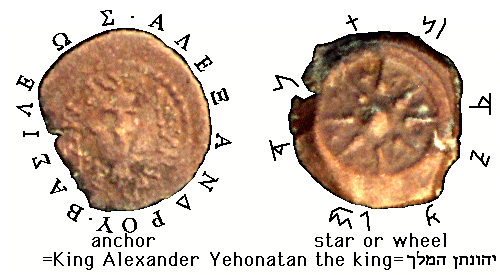 a Jewish coin of king Alexander Jannaeus, about 100 BC
a Jewish coin of king Alexander Jannaeus, about 100 BC
The king was eventually killed by his "friends". The faithful Jews won their freedom. They even minted their own coins, named "lepton" in Greek, "prutah" in Hebrew, and "mite" in the King James Bible. Jesus praised a widow who put two such small coins in the Temple treasury, which was all that she had (Luke 21:1-4).
Communication under times of persecution
Suppose you were living then, hiding in the desert, so that you could remain faithful to God. You wanted to send a letter of encouragement to your friends in the city who are being hunted down and killed. You want to tell them that Antiochus is merely a tool of Satan and that God was in ultimate control and would win the last battle. You wanted to tell them to keep resisting the king, even die if necessary, and never to give up their faith in God. That is what you want to write in your letter. But that letter may fall into enemy hands! It would then be destroyed and give no further encouragement to anyone. Furthermore the enemy could start searching for you to kill you as well.
Suppose your letter contained the following statements: "I am Jonathan. I am hiding in a cave five miles west of Jericho. King Antiochus is a tool of Satan and will eventually be defeated by God. Resist Antiochus and keep believing in God, even unto death, for he will raise us to live again." What might happen if the king's army intercepts your letter:
Who would the army look for?
Where would they look for you?
What would they probably do to you when they found you?
How many more faithful Jews would then get to see your letter?
Suppose instead that you used this coded language where words have meanings different from their ordinary meanings: "I am the prophet Elijah writing from my cave on Mt. Sinai. God showed me a vision today. In this vision a giant pig rose out of the depths of the earth and made everyone eat his manure and filth and then wash themselves in it or else die. But the Ruler on the high throne sent a warrior on a white horse to kill the pig and all those people who were dirty. Everyone who stayed clean to the end was saved."
Who would the army look for?
Where would the army look for him?
Would they find him there?
Would they keep looking for him after they found out that Elijah had died five hundred years earlier?
Since you have not revealed your true name or hiding place, could the army use this letter as evidence against you?
The army would also see that the letter was nothing more than a harmless fairy tale about a pig and a rider on a white horse who saves the people. They would probably allow the stupid letter to circulate. By writing in such a language you would save your own neck and still get your message through, even if the enemy read it. The Jewish readers would know that Antiochus was the pig, that he was sent from Hell, that his policies were the filth, that God was the ruler on the high throne, that the warrior was God's servant, that Antiochus would eventually loose the battle, and that everyone who remained faithful to God (clean) would be rewarded. Your letter would have succeeded if you wrote it this way. Such special language is called "apocalyptic", meaning "hidden". It was invented during years of persecution to give encouragement to the faithful. Apocalyptic literature was used in the books of Daniel, 2 Ezdras in the Apocrypha, and Revelation.
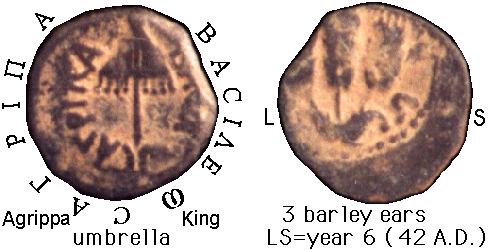 coin of Herod Agrippa I the year before he killed James
coin of Herod Agrippa I the year before he killed James
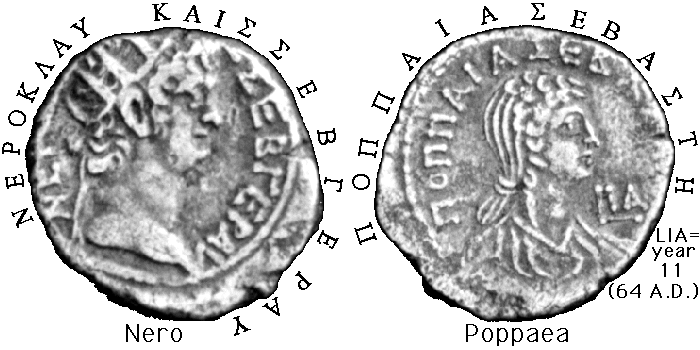 coin of Nero and Jewish wife Poppaea from the year 64 AD that Nero blamed Christians for burning Rome. Nero killed Poppaea by kicking her in the stomach after three years of marriage.
coin of Nero and Jewish wife Poppaea from the year 64 AD that Nero blamed Christians for burning Rome. Nero killed Poppaea by kicking her in the stomach after three years of marriage.
Roman Persecutions
Before the New Testament was completely written, Christians were being killed for their faith. The Book of Acts records the death of Stephen (7:60) and James (12:2) under Herod Agrippa I. Later, Peter and Paul were among many killed (mid-60's) during the reign of Roman emperor Nero.
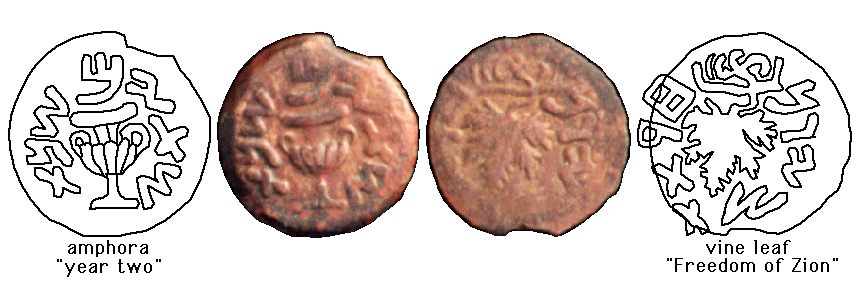
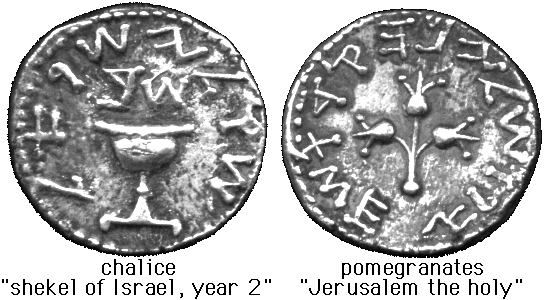 Jewish coins during revolt year 2, proclaiming "Freedom of Zion" and "Jerusalem the holy">
Jewish coins during revolt year 2, proclaiming "Freedom of Zion" and "Jerusalem the holy">
In the late 60's the Jews revolted against Roman rule and minted their own coins. After five years, during the reigns and leadership of Vespasian and Titus, the Jews were defeated, the Temple was destroyed (70 A.D.), the fortress at Masada was overrun, over a million Jews were killed, and the survivors were exiled. The Romans proclaimed the defeat of the Jews on numerous coins issued throughout the empire as a warning to other people who might be thinking of revolting.
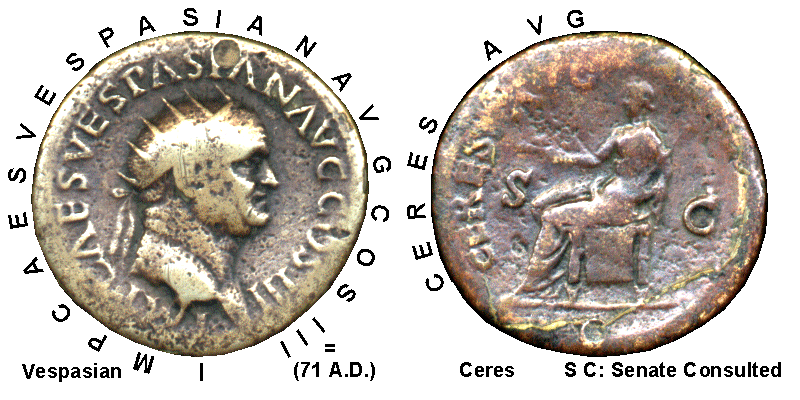 coin of Vespasian, 71 AD
coin of Vespasian, 71 AD
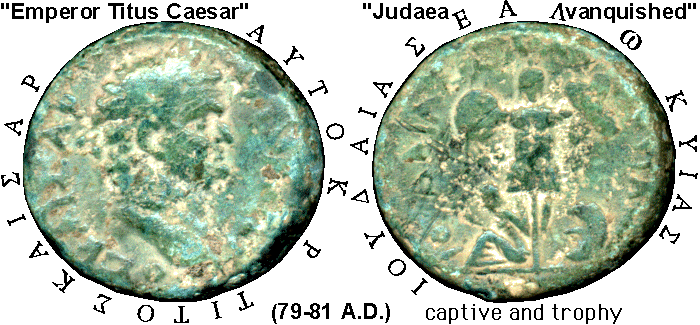 coin of Titus, about 80 AD, proclaiming "Judaea vanquished"
coin of Titus, about 80 AD, proclaiming "Judaea vanquished"
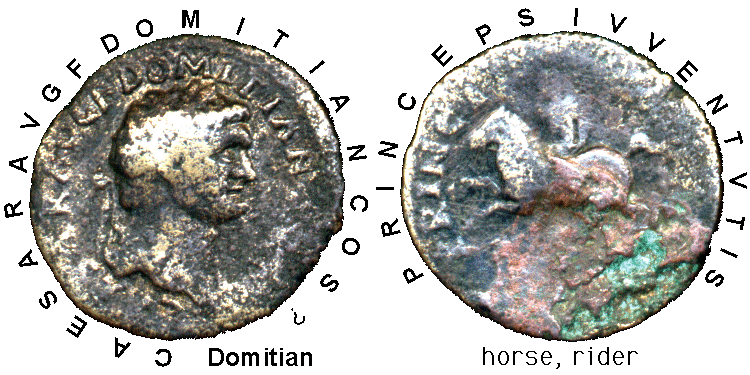 coin of Domitian
coin of Domitian
When Domitian (81-96 A.D.) became emperor, he demanded worship of himself as a god. All people had to address him as "Lord and God". Naturally, neither the Jews nor the Christians could do so and remain true to their faith. Those who were discovered to be faithful therefore faced punishment or death for refusing to acknowledge Domitian as God. The Book of Revelation was written for the Christians facing this severe persecution.
John
At Ephesus, whose ruins are in western Turkey, lived John, son of Zebedee and brother of James who was killed by Herod. John, the favorite apostle of Jesus, who had already written the gospel of John, refused to worship the emperor. But the Romans were smart. Rather than kill this old man and make him a martyr, they exiled him to the island of Patmos, offshore, and then proceeded to persecute the ordinary Christians who thereby lost their leader (bishop). John now wants to write a letter of encouragement to the Christians. The Roman army already has him locked up, so there is no need or possibility of disguising his name or location. So John boldly signs his name and tells where he is and why.
WRITE what John says in Revelation 1:9.
But John wants his letter to get past the Roman army censors. He wants to tell his friends about the evil Roman rulers and that God is still in control. He decides (prompted by the Holy Spirit) to fool the Romans by using the apocalyptic style. The guards read the letter and think that John has gone insane or is suffering from senility. They let his stupid letter go on its way. John wins! And his letter has been saved for us as the book of Revelation.
It is very important that you get the idea of a coded language. Revelation is in code. You will only get some false ideas about the book if you do not recognize this. We will not break all of the coded information in Revelation because some meanings have been lost. If you do not understand how these codes work, be sure to ask someone for help.
 a Jewish coin of king Alexander Jannaeus, about 100 BC
a Jewish coin of king Alexander Jannaeus, about 100 BC coin of Herod Agrippa I the year before he killed James
coin of Herod Agrippa I the year before he killed James coin of Nero and Jewish wife Poppaea from the year 64 AD that Nero blamed Christians for burning Rome. Nero killed Poppaea by kicking her in the stomach after three years of marriage.
coin of Nero and Jewish wife Poppaea from the year 64 AD that Nero blamed Christians for burning Rome. Nero killed Poppaea by kicking her in the stomach after three years of marriage.

 Jewish coins during revolt year 2, proclaiming "Freedom of Zion" and "Jerusalem the holy">
Jewish coins during revolt year 2, proclaiming "Freedom of Zion" and "Jerusalem the holy"> coin of Vespasian, 71 AD
coin of Vespasian, 71 AD coin of Titus, about 80 AD, proclaiming "Judaea vanquished"
coin of Titus, about 80 AD, proclaiming "Judaea vanquished" coin of Domitian
coin of Domitian